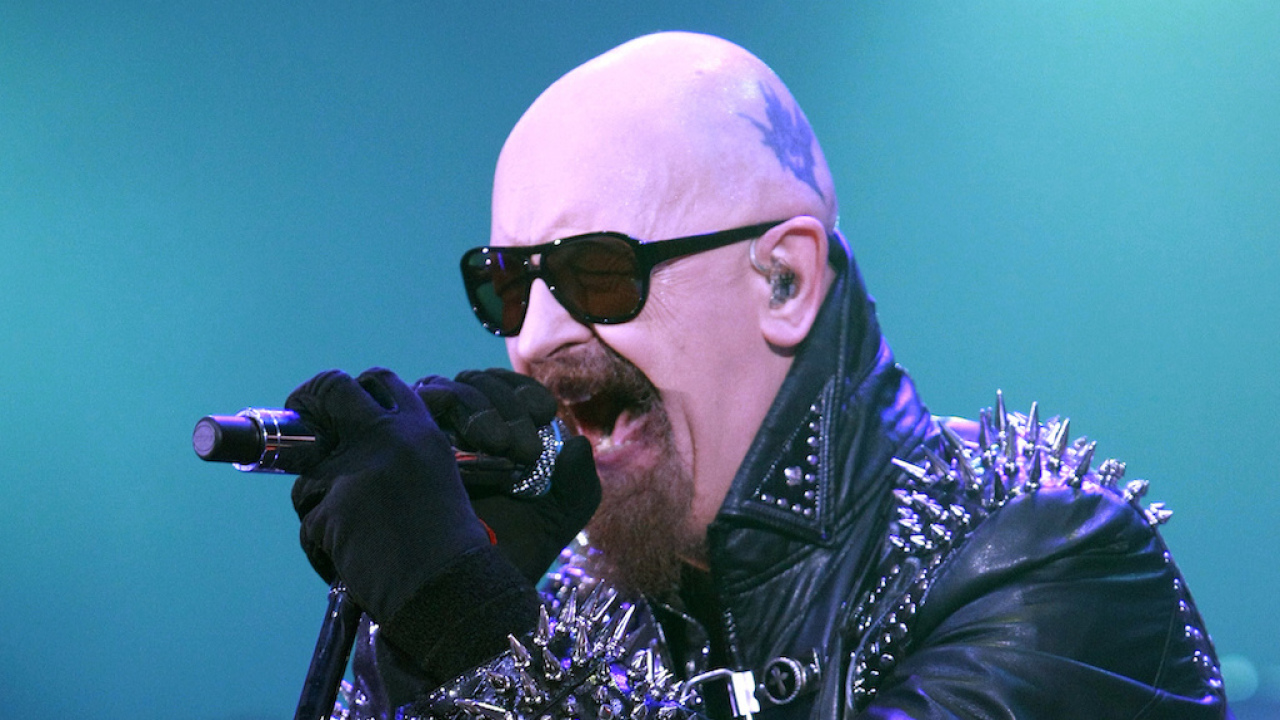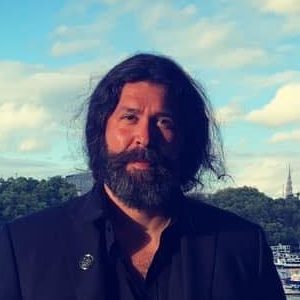Last night on the Metal Hammer Radio Show, Judas Priest frontman was our guest for a special extended interview about the new album, celebrating 40 years of Judas Priest and writing good metal songs about a broken heart.
It’s been six years since Nostradamus and now you’re coming back with Redeemer Of Souls, what took you so long?
“We did a huge tour Epitaph, that took a two-year chunk out of a six-year period. And we got off the road and knew we had a new record to start thinking about, but we’d already started to scratch the surface before the Epitaph tour started. This, of course, was an unusual time for Judas Priest because we were actively searching for the amazing Richie Faulkner, that we discovered. When he joined the band we were able to get close to him and get into what makes a band click in the creative sense. So the tour enabled us and Richie to get together and to really develop the ideas of where we were going next. After the tour we took a little break before serious writing started to take place. So if you condense it all down, how long does it take for a band to make a record? Well as long as it takes. Some bands take forever to make a record. This came together really quickly once we’d got the focus and understanding of the point we were aiming for with Redeemer Of Souls.”
Was there a sense of loss taking to the stage with someone other than K.K.? It’s quite an adjustment for someone to make.
“It was an adjustment, yeah. And this isn’t meant to be taken differently, but Richie brings a new dynamic to the performance. He’s in his own world and that’s what all of us in Priest try to project. No band is made up of one particular character, it’s everyone pulling together and projecting the sound of what the group is trying to do. And Richie brought a different dimension that was infectious and you could instinctively feel that something important was about to take place. From Richie’s stellar work night after night on tour to getting together as a writing team. It was good times over and over again.”
**Entering the studio is a different beast to playing on stage, was there a sense of nervousness? **
“No, he’s a complete musician in the sense of the word that he’s already established himself through his solo activities and he’s toured extensively. He’s an accomplished player and knows everything you need to know outside of being a wonderful guitarist. The components of writing, the elements of arranging and all other aspects of putting a record together. The core thing is that he’s told this story where he used to headbang in front of the mirror to Screaming For Vengeance, all those years back, so he’s a fan of Judas Priest. He knows everything about this band and he still says he can’t believe he got the gig. The transition could have been difficult but it was flawless. Everything went really really well.”
Following on from Nostradamus, that divided opinion amongst fans, did you feel like you had to get back to what Priest does best with this new album?
“We love Nostradamus, and I think as time passes people are enjoying the record for being ambitious and a very unusual record to make. I don’t know any other metal band that have made that conceptual type of exploration for a long time. We’ve always wanted to do it ever since Priest got together, and we always acknowledge our manager for bringing up that idea. You have to commit yourself to a concept record. If you go to the movies you don’t walk out halfway through – unless it’s rubbish – so you’ve got to do that with Nostradamus. To get the most out of it you have to dedicate an hour of your life to listen to it. It’s like watching a movie in your head. Having said that, we knew that to come back now and celebrate the 40th anniversary of Priest, we had to re-establish some of the great things that mean this band can keep making metal. This is music that’s straight from the heart. We wanted to make a fierce, relentless, fast heavy metal album and I think we did it well.”
**Having seen some of the hellish artwork for Redeemer Of Souls, is there a concept to speak of? **
“The artwork for metal is very important – you’re trying to convey the spirit of the music. And the story that we put behind the artwork is that we’ve take the fallen angel from the Sad Wings Of Destiny, pushed him up into the Painkiller time in the 90s and now we’ve turned that redeemer into the new cover. It’s great. You couldn’t meet a band more dedicated to the world of heavy metal than Judas Priest. This is the life that we’ve lived, and this particular artwork projects that self-belief and power.”
It’s no secret that you’re a fan of heavy metal, and there’s so much metal these days, do you think that bands are forgetting about the ballad and how to be sensitive?
“I think some bands are doing it. The roots of metal came back to the Midlands with Priest and Sabbath and now it’s sensational the variety that’s out there for you to pick and choose. I guess again, depending on what kind of metal you’re playing, it might be some kind of alien area to go into that kind of sensitivity. Sometimes it’s out of your league to portray that type of performance. But if you’re able to it just shows another dimension. Metal music is about conveying emotion and I don’t care how fierce your band is, everyone has had a broken heart. Everybody’s had a mishap. And sometimes you talk about that with a feeling of rage or in a strong and sensitive manner. If you’re in a band and want to explore the virtues of being a musician you should try absolutely everything. Don’t push it away from you just because the words don’t sound right, take those feelings and convey them into some kind of musical performance. I love all kinds of metal music, I’m just as mad about metal in my 60s as I was when I was 16.”
Do you remember your first heartbreak?
“It was later on in life, it was in my 20s. Even talking as a gay guy – we get broken hearts too, folks. It’s a hellish thing to go through but it’s a part of life. Life is about loving and living and experiencing everything that can be thrown at you. There’s music for that and we all listen to metal depending on the mood we’re in. If i’m in the mood for classic metal I’ll listen to that kind of band, if I want to rage I’ll listen to Slayer or Cannibal Corpse or Emperor or Behemoth. It depends where I’m at in my day. The emotional connection through music has always been very important to me.”
Did you write a song about that experience?
“I did actually, I think it was called Before The Dawn. I know the hardcore fans out there are going to be reading this and getting on their laptops and checking the lyrics now. It may not in be in true essence, but it was relative to that incident.”
**It’s 40 years of Judas Priest, 30 years of Defenders Of The Faith, do you celebrate anniversaries? **
“You celebrate them in the way that it’s a very special moment and we’re getting a lot of those, they seem to be bumping into each other. I’m sure there’s another one looming on the horizon. I’ve been celebrating Defenders… just by listening to it again for the first time in a long time. There’s some good songs on there like Love Bites and Jawbreaker. When you’ve made 17⁄18 albums and written hundreds and hundreds of songs, you sometimes forget where you’ve been and what you’ve done. An anniversary stimulates me to go back and check out things we did do all those years ago. The great thing is that they still sound vital and relevant, they don’t sound old-fashioned, and I think that’s particularly great about metal in general. You rarely hear a song about a metal band that you feel is dated and that’s not just for Priest – good metal lives forever.”

